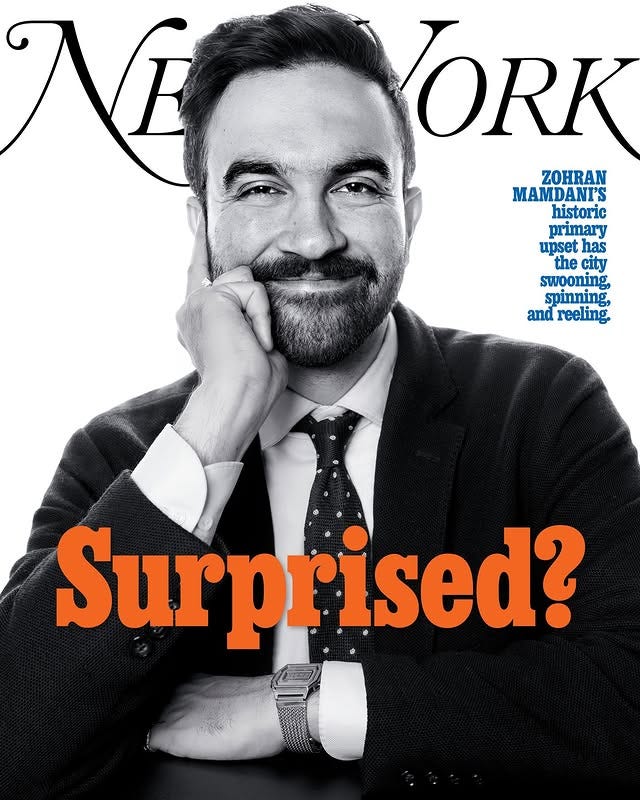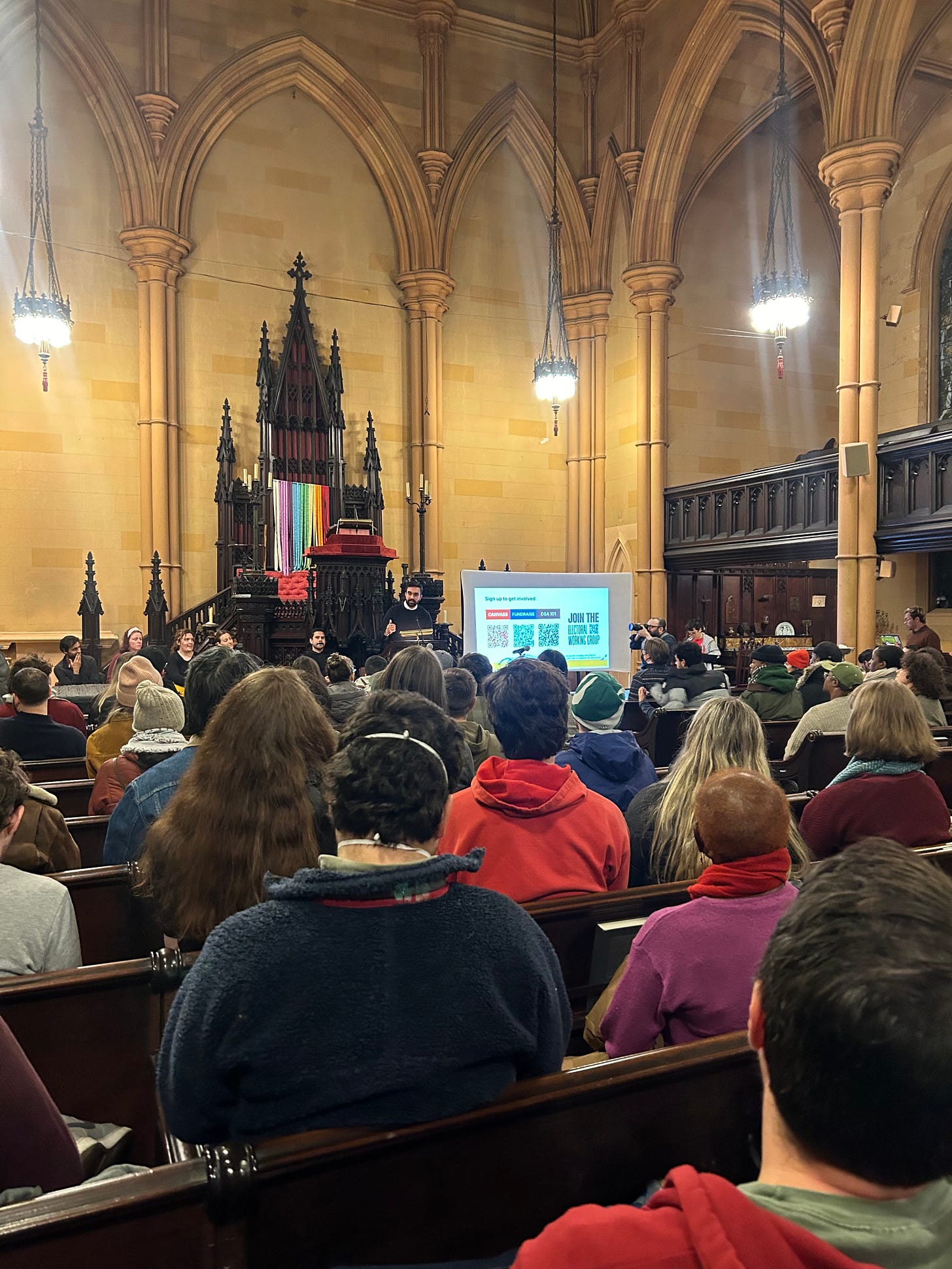How the media completely missed Zohran Mamdani
And how it shows just how out of touch they are
By now, you certainly know the name Zohran Mamdani, the 33-year-old democratic socialist who stunned the world winning the New York City Democratic primary in the race for the mayoral election, triumphing over disgraced former governor Andrew Cuomo. Zohran beat Cuomo by an ass-kicking 12-points, according to the Board of Election's final ranked-choice voting results.
Mamdani won the election on a campaign promising to address the affordability crisis and lower the cost of living in New York City. Cuomo barely even ran a campaign.
People all over the media have been giving their takes on how this happened. Emblematic is New York Magazine’s latest cover featuring a photo of Zohran splashed with the word, “Surprised?”
Not really. Anyone who’s been paying attention to him and the affordability crisis wrecking this city shouldn’t be. The fact that anybody is surprised is a reflection of how out of touch the mainstream media is.
I’ve been following Zohran since December when I attended one of his early town halls at the Unitarian Universalist church in Brooklyn Heights. It was a cold rainy night, and yet there was a line snaking outside the door. I got in, and squeezed into the pews. Zohran took to the dais and outlined a crystal clear vision: affordability, affordability, affordability. For as long as I’ve ever known New York City, breaking the bank has just been a fact of life. And now here was someone saying: it doesn’t have to be this way. The room listened intently. He was electric. Drawing a crowd like this six months out from a local primary election? I was very impressed.
I knew immediately I wanted to write about Zohran. I exchanged contacts with his comms director, and we had coffee to discuss a profile of him. By mid-March, he had catapulted to second place in polling behind Cuomo, and was also in the lead with fundraising (with an average contribution of $84). I wrote a pitch to profile him and sent it to multiple major magazines. To quote myself:
The rise of Mamdani speaks to a profound disillusionment with the Democratic Party. Mamdani has built a broad, multiracial, working-class coalition, but as a socialist and anti-Zionist, can it reach a critical mass? His rise is also a test. The Democrats lost because they failed to change. Are they finally ready?
Through this piece, I want to explore the revival of this insurgent left, and its potential to wield power in the Democratic Party. Whether or not he wins, Mamdani is just getting started. His rise represents a new generation coming to power—the millennial left. And the Democrats are not going to like it.
The responses were: no, too much of a long shot, not nationally relevant, or just no response at all.
I am not saying this to say I told you so (although that does feel nice). The point is: establishment media didn’t take him seriously, and only started to give him real attention a few weeks out from the election after AOC endorsed him and he smoked Cuomo in the debates.
Zohran landed his first big profile with Politico Magazine in late March, but this piece fell short, focusing on his mode of communication rather than his message. Yeah, he’s damn good on social media. But that’s not because he picks nice filters. It’s because he has something to say. NYT, the next day, published a short profile dubbing him a “TikTok Savant.”
New York Mag also profiled him in late May, but frankly, that piece also missed the mark. There are for sure real questions about Zohran’s years of experience and ability to govern, and I don’t doubt the dimension of that reporting. But the piece did not grapple at all with his appeal—why Zohran's vision was so captivating for voters in the first place. It did not address the profound disillusionment with Democratic Party and how much New Yorkers are struggling. It depicted him as just an idealist with nice ideas.
What’s consistently missing is the recognition that NYC is in the midst of a true affordability crisis. But the media is not acting like it. It’s not rocket science. People work an enormous amount and still can’t afford to do the most basic things in life — afford childcare, pay off their debts, afford rent increases, buy a house or apartment. Any serious coverage of Zohran and this race needs to relentlessly keep that front and center. People are struggling. Child care is among the highest in the nation, costing parents an average of $18,200 per year. The increased cost of living has plunged an additional 100,000 New Yorkers into poverty this past year alone, meaning now one of four New Yorkers lives in poverty. One in five New Yorkers struggle to afford $2.90 to ride the subway. Meanwhile, the population of millionaires has jumped by 48% over the last decade. NYC is now home to 123 billionaires, with a collective net worth of $759 billion.
Make no mistake, this isn’t only a blue collar issue. College-educated professionals are having a tough time too. I have friends with Ivy League degrees working big corporate jobs and are still stressed about whether they can make it in this city, especially when kids enter the picture. Don’t get me wrong: their experience is obviously not the same as a blue collar family. But if people making $200k can’t figure out how they’re going to stay here long term, then who the hell can? We’re all in the same boat here, struggling in a broken system that only works if you’re making millions.
And yet instead, as Zohran kept soaring in the polls in the run up to the election, rather than try to interrogate why this was happening, major publications instead pulled out all the stops to thwart him. The New York Times published its infamous scathing non-endorsement editorial (even though they ended local endorsements last year). The Atlantic ran an essay entitled, “New York Is Not a Democracy,” suggesting that if Zohran won, it would be because of the “warped” system of ranked-choice voting. What became even worse was the media’s obsession with Zohran’s stance on Israel and baseless allegations of anti-semitism. When Zohran went on The Late Show with Stephen Colbert, one of the first questions Colbert asked Zohran was, “Does the state of Israel have the right to exist?” I almost thought that was supposed to be a joke making fun of all the interviewers who’ve done that. It wasn’t.
Aside from the fact that Zohran was sitting next to NYC comptroller Brad Lander, who is Jewish and cross-endorsed Zohran; that Zohran has committed to increasing funding by 800% to combat hate crimes including anti-semitism in NYC; that nearly 70% of Democrats and 53% of Americans have an unfavorable view of Israel; that New Yorkers are sick of bankrolling Israel’s massacre in Gaza; that criticizing Israel is not anti-semitic; and that Zohran is seeking the role of mayor of New York City and not the Secretary of State—much of the media focused on his views on foreign policy rather than his actual platform for all New Yorkers. Tucker Carlson, of all people, praised Zohran for saying in the first debate yeah, I’ll stay in NYC and meet Jewish New Yorkers where they're at in the city and not go to Israel.
Rather than framing coverage on behalf of voters, a lot of media, consciously or not, largely framed it on behalf of those in power. Just like the Democrats this past election, the media didn’t listen to what people were saying: they want to be able to afford to live a good life, and they don’t want to bankroll Israel’s massacre of Palestinians. Then when Zohran won, they acted stunned. The only thing stunning is their blindness. If the media couldn’t even properly grasp Zohran right in their own backyard, then no wonder they missed Trump in 2016.
Why did this happen? Part of it I think is that, in general, publications are deeply risk averse. As an independent journalist who writes about emerging people and movements, it sometimes feels like publications don’t want to cover a story until it’s already been done. They look around and think if there’s been so little coverage, then maybe it’s not a thing. Jobs are scarce in media, so maybe editors don’t want to go out on a limb. Or maybe they are too strapped and don’t have the bandwidth and can’t prioritize anything that’s not immediate. So they wait until something undeniable happens, like Zohran’s victory, and everyone rushes to the door at the same time, racing to catch up and overwhelming readers with a gazillion stories that prioritize the news over the actual issues. It’s so bizarre, frustrating, and irresponsible. Journalism should be proactive, not reactive.
When it comes to Zohran, I have to imagine part of missing him probably is generational too. Mainstream media is run by Boomers and Gen Xers who grew up with different perspectives on Israel and socialism that have rapidly changed in recent years—man are we down bad with a Red Scare hangover. American media is distinctly myopic. Murdoch media is gonna do its thing. And not to get all Noam Chomsky, but yeah, American mainstream media is deeply centralized and profit-driven. I’m not saying journalists are individually compromised. But when you have major financial stakeholders, there are certainly institutional pressures at play that are probably not gonna be excited about a Mamdani agenda.
And yet, despite all of that, despite the death threats, billionaire tantrums, relentless Islamophobia, and Cuomo’s historic $25 million super PAC, Zohran still came out on top, handily winning everything from working-class neighborhoods in the outer-boroughs to Hudson Yards, the Financial District, and Soho. It’s a remarkable triumph for Zohran, and an embarrassment for establishment media. Between Kirsten Gillibrand’s vile racism and President Trump’s calls to deport Zohran, this race is only getting started. I can only hope in this next chapter, the media asks itself hard questions about how they missed Zohran, and who their coverage is for. In the age of Trump and such poor trust in media, we can’t afford to keep getting this wrong.





You called it! Who's going to win the midterms?